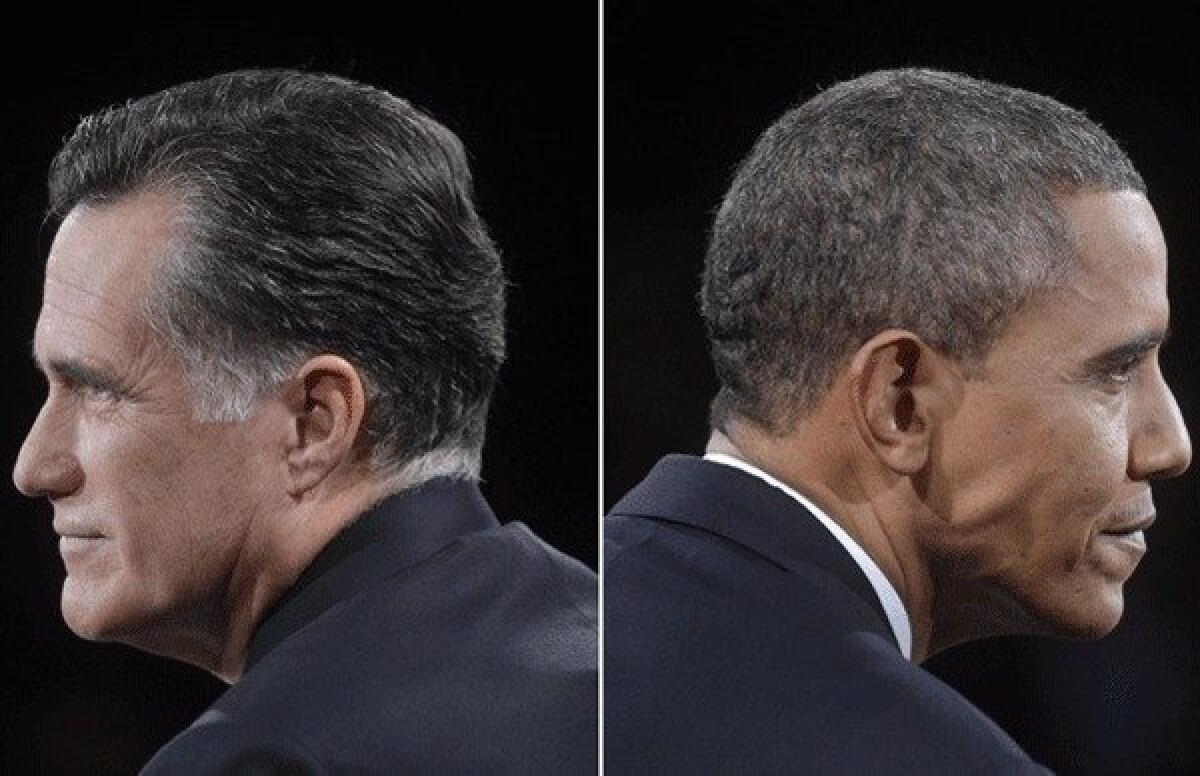McManus: The likely winner -- gridlock

- Share via
After a year of campaign sound and fury, we’re about to hold an election that will probably fail to usher in the one thing voters of all stripes would like to see: an end to the partisan gridlock in Congress.
Neither President Obama nor Mitt Romney appears likely to win the kind of landslide victory that provides a mandate for big change. And whoever wins the presidency is almost certain to face at least two years of divided government in Congress: a Republican House, a Democratic Senate.
No problem, both candidates have said in recent weeks, insisting that reasonable members of the other party can be persuaded to cooperate.
SLIDESHOW: Six numbers to ignore from the presidential campaign
“I’m going to have to reach across the aisle and meet with good Democrats who love America,” the newly moderate Romney told supporters in Virginia last week. “And there are good Democrats like that,” he felt it necessary to add.
Obama’s professed his bipartisanship too. “We don’t need a partisan agenda; we need a common-sense agenda,” he said in Las Vegas, trying to revive his old post-partisan persona. But the priorities he listed — federal spending on education, energy and job creation — sounded as Democratic as ever.
Both candidates have plenty of plans — for fiscal policy, economic policy and every other kind of policy. But neither has offered much of a plan for bridging the partisan divide and breaking the deadlock over fiscal policy — beyond hoping that the election’s results are one-sided enough to shock the other side into submission.
ENDORSEMENTS: The Times’ recommendations for Nov. 6
In an interview with the Des Moines Register — released only after the newspaper chided him for wanting to keep it off the record — the president laid out a rough timeline for the first year of his second term. It begins with an acknowledgment that compromise will be difficult, starting with negotiations to avoid the “fiscal cliff,” the draconian spending cuts and tax hikes that kick in automatically at the end of the year unless Congress intervenes.
“I believe in the first six months we are going to solve that big piece of business,” Obama told the Register. “It will probably be messy. It won’t be pleasant.”
Once that fiscal bargain is struck, Obama said, bipartisan agreement should be possible on corporate tax reductions, regulatory reform, more spending on infrastructure and immigration reform — all areas that he suggested “should be non-ideological.”
Has he not been paying attention the last four years? This is a Congress that can’t even agree on what kind of utensils to use in the House cafeteria.
Immigration reform, in particular, is an issue designed to tear Congress in two. Most GOP leaders, including Romney, recognize that their party won’t have a future unless it sheds its anti-immigrant image, but grass-roots conservative opposition to anything that sounds like amnesty has made it impossible for Republicans (including Romney) to move very far.
But at least Obama has suggested some areas in which he’d try to forge compromises. The Republican candidate has been even less specific, breezily assuring voters that he knows how to work with Democrats because he did it as governor of Massachusetts. But Romney’s record in Boston wasn’t really four years of genial comity; it was more like three years of gridlock (the legislature overrode more than 700 Romney vetoes) interrupted by one brilliant piece of bipartisan legislation, the healthcare law that Romney passed with help from the late Sen. Edward M. Kennedy.
Romney’s professions of bipartisanship also collide with promises he has made to his own supporters — promises he could scarcely abandon even if he wanted to (and he says he doesn’t). On “Day One” of his presidency, the GOP candidate says, he would begin the work of repealing Obama’s healthcare law — something Senate Majority Leader Harry Reid has vowed to block. If a straightforward attempt to repeal Obamacare fails in the Senate, many Republicans want to undermine the law by blocking its implementation and funding — a guerrilla campaign that would embitter Democrats and undercut cooperation on other issues.
So even if a President Romney turns out to be the Moderate Mitt of October 2012 instead of the severe conservative who won the Republican nomination, he’ll still be pursuing deep cuts in domestic spending that most Democrats will resist.
We’re in strange political times. The only clear mandate from the electorate is to end the partisan divide, but that seems to be the one message our political leaders can’t hear. Both sides take the narrowest of wins as a clear mandate for their most extreme views. They’re all for compromise, as long as it’s the other side doing the compromising.
My reluctant forecast for Tuesday’s outcome: a victory for gridlock.
Follow Doyle McManus on Twitter @DoyleMcManus
More to Read
A cure for the common opinion
Get thought-provoking perspectives with our weekly newsletter.
You may occasionally receive promotional content from the Los Angeles Times.











